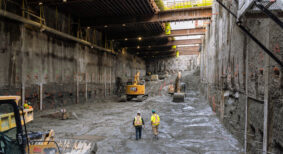Housing is a major focus of the 2024 federal budget and industry reaction has been mixed.
There is a promise of at least 1.2 million more homes for Canadians and along with the $6 billion Canada Housing Infrastructure Fund, an additional $500 million will be spent over five years for municipal community, culture and recreation facilities through the Green and Inclusive Buildings Program.
The Canadian Construction Association (CCA) believes the federal government’s housing strategy is a long-awaited step forward to build more homes, but significantly more investment is needed to address critical infrastructure and the housing crisis.
The association said an additional $128 billion is needed to build, support, and connect the federal government’s proposed 1.2 million homes to essential housing-enabling infrastructure – a major shortfall in the investment needed.
“Budget 2024 sets a bold objective to help Canadians buy homes but misses the mark on delivering sufficient investment and a plan to ensure a steady flow of funds to address our nation’s infrastructure challenges,” said Mary Van Buren, CCA president. “While we acknowledge some initiatives, such as funding for creating affordable apartments, training and recruiting more workers, and upgrading water and wastewater systems, the conditions attached and lack of strategic vision are concerning.”
With growing demands to not only build more homes but also the inevitable requirement for the necessary housing-enabling infrastructure to connect these homes to the services they need, CCA says the urgency to collaborate with provinces, municipalities, and the industry is more pressing than ever.
“We need investments in infrastructure that are made based on the real needs of Canadians – projects that are shovel-worthy rather than just shovel-ready,” said Van Buren. “This visionary and consultative approach is what Canadians deserve.”
BC Construction Association echoed CCA’s concerns, noting the 2024 federal budget falls short on a number of policies required to meet the needs of B.C.’s construction industry, specifically in terms of workforce solutions and infrastructure.
The Federation of Canadian Municipalities applauded the significant new investments contained in Budget 2024 such as the $1 billion for urgent community infrastructure, including water and wastewater management. But it also stressed the housing crisis cannot be resolved without investing in local infrastructure.
“FCM has been clear that for every new home built, there must be a corresponding investment in infrastructure. Ottawa has heard us on this front. We will work in collaboration with the federal government to discuss the details of the funding and how we can deliver these important immediate investments to Canadians in parallel with fixing our funding model for the long term,” said FCM president Scott Pearce.
“The sheer volume of pre-budget announcements on housing and the billions committed by Ottawa reveals the sense of panic that has gripped the federal government. The policies are disjointed, ill-conceived, confusing, and often conflict with those of not only other levels of government but also of Ottawa itself. None of this is going to deliver any meaningful relief to Canadians being crushed by the weight of the affordability crisis,” said ICBA president Chris Gardner.
ICBA called the budget a missed opportunity to address the inherent systemic problems holding back Canadian prosperity.
“Canada faces a trifecta of closely linked economic problems: stagnant productivity, a pattern of weak business investment, and declining global competitiveness. Unfortunately, there is little in Budget 2024 that tackles these problems in a meaningful way,” said Jock Finlayson, ICBA chief economist. “Expanding the size and cost of government won’t reverse the negative trends that are weighing on living standards and sapping Canada’s economic vitality.”
The Greater Vancouver Board of Trade echoed similar sentiments.
“While there were some positive measures, we hoped for a budget that would create the conditions for inflation and interest rates to moderate, while also spurring private sector investments to foster robust economic growth and high quality, family supporting jobs,” said Bridgitte Anderson, president of the Greater Vancouver Board of Trade.
“Instead, we face $120 billion in deficits over the next three years combined with government policy that has thus far been unable to reverse our lagging productivity, flat growth, and a worsening cost of living crisis.”
Cheryl Mah is managing editor of Construction Business.









